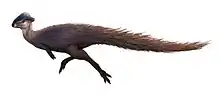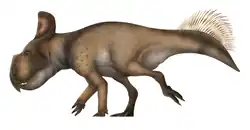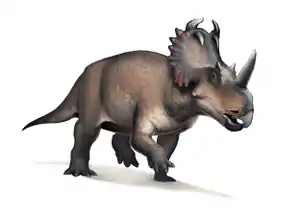| Ojoceratops Temporal range: Late Cretaceous, | |
|---|---|
 | |
| Life restoration | |
| Scientific classification | |
| Domain: | Eukaryota |
| Kingdom: | Animalia |
| Phylum: | Chordata |
| Clade: | Dinosauria |
| Clade: | †Ornithischia |
| Suborder: | †Ceratopsia |
| Family: | †Ceratopsidae |
| Subfamily: | †Chasmosaurinae |
| Tribe: | †Triceratopsini |
| Genus: | †Ojoceratops Sullivan & Lucas, 2010 |
| Type species | |
| †Ojoceratops fowleri Sullivan & Lucas, 2010 | |
Ojoceratops ( meaning "Ojo Alamo horned face") is a genus of ceratopsian dinosaur which lived in what is now New Mexico, United States. Ojoceratops fossils have been recovered from strata of the Ojo Alamo Formation (Naashoibito Member), dating to the late Cretaceous period (probably Maastrichtian age, 68 million years ago[1]). The type species is Ojoceratops fowleri.
Classification

It is very similar to its close relative Triceratops, though it is from an earlier time period and has a more squared-off frill.[2] Nick Longrich, in 2011, noted that the squared-off frill is also found in some true Triceratops specimens and that Ojoceratops is probably a junior synonym of Triceratops,[3] while Holtz (2010) noted that it is probably ancestral to Triceratops and possibly synonymous with the contemporary Eotriceratops.[4]
See also
References
- ↑ Sullivan, R.M., and Lucas, S.G. 2006. "The Kirtlandian land-vertebrate "age" – faunal composition, temporal position and biostratigraphic correlation in the nonmarine Upper Cretaceous of western North America." New Mexico Museum of Natural History and Science, Bulletin 35:7-29.
- ↑ Robert M. Sullivan and Spencer G. Lucas, 2010, "A New Chasmosaurine (Ceratopsidae, Dinosauria) from the Upper Cretaceous Ojo Alamo Formation (Naashoibito Member), San Juan Basin, New Mexico", In: Ryan, M.J., Chinnery-Allgeier, B.J., and Eberth, D.A. (eds.) New Perspectives on Horned Dinosaurs: The Royal Tyrrell Museum Ceratopsian Symposium, Bloomington, Indiana University Press, 656 pp.
- ↑ Nicholas R. Longrich (2011). "Titanoceratops ouranos, a giant horned dinosaur from the Late Campanian of New Mexico". Cretaceous Research. 32 (3): 264–276. doi:10.1016/j.cretres.2010.12.007.
- ↑ Holtz, Thomas R. Jr. (2011) Dinosaurs: The Most Complete, Up-to-Date Encyclopedia for Dinosaur Lovers of All Ages, Winter 2010 Appendix.

.png.webp)


